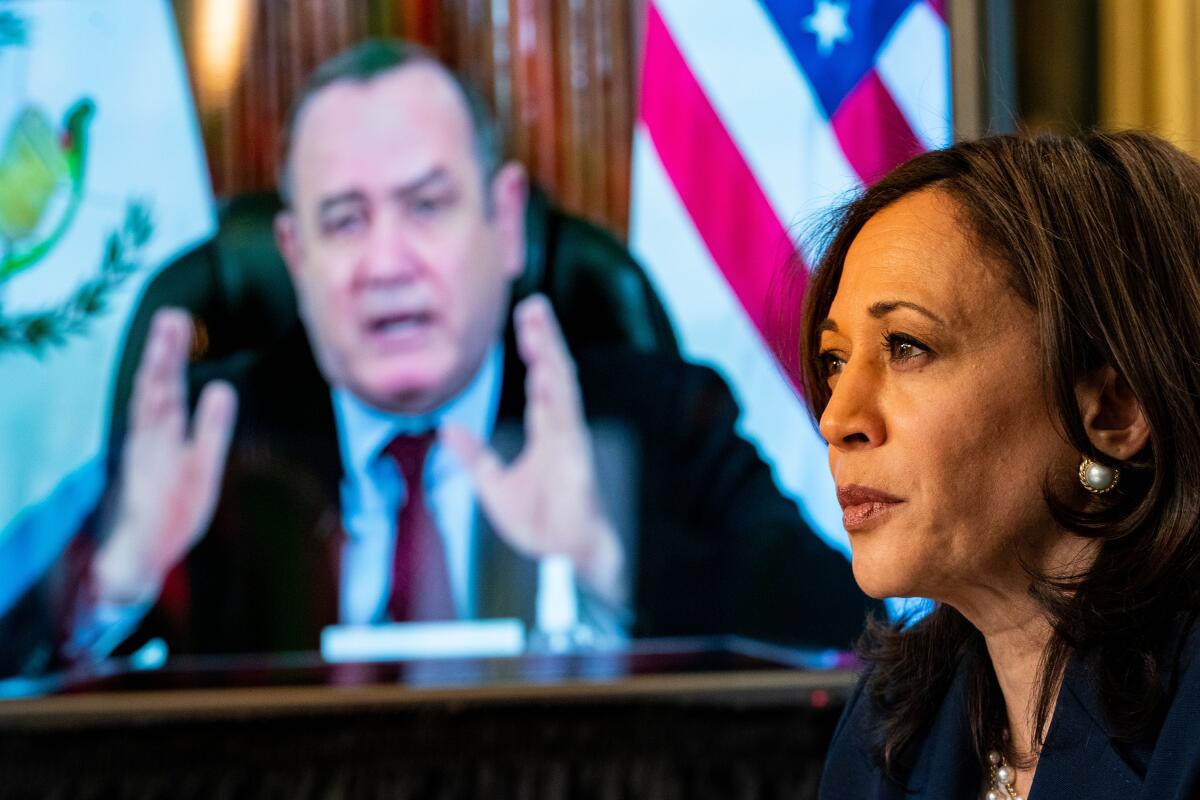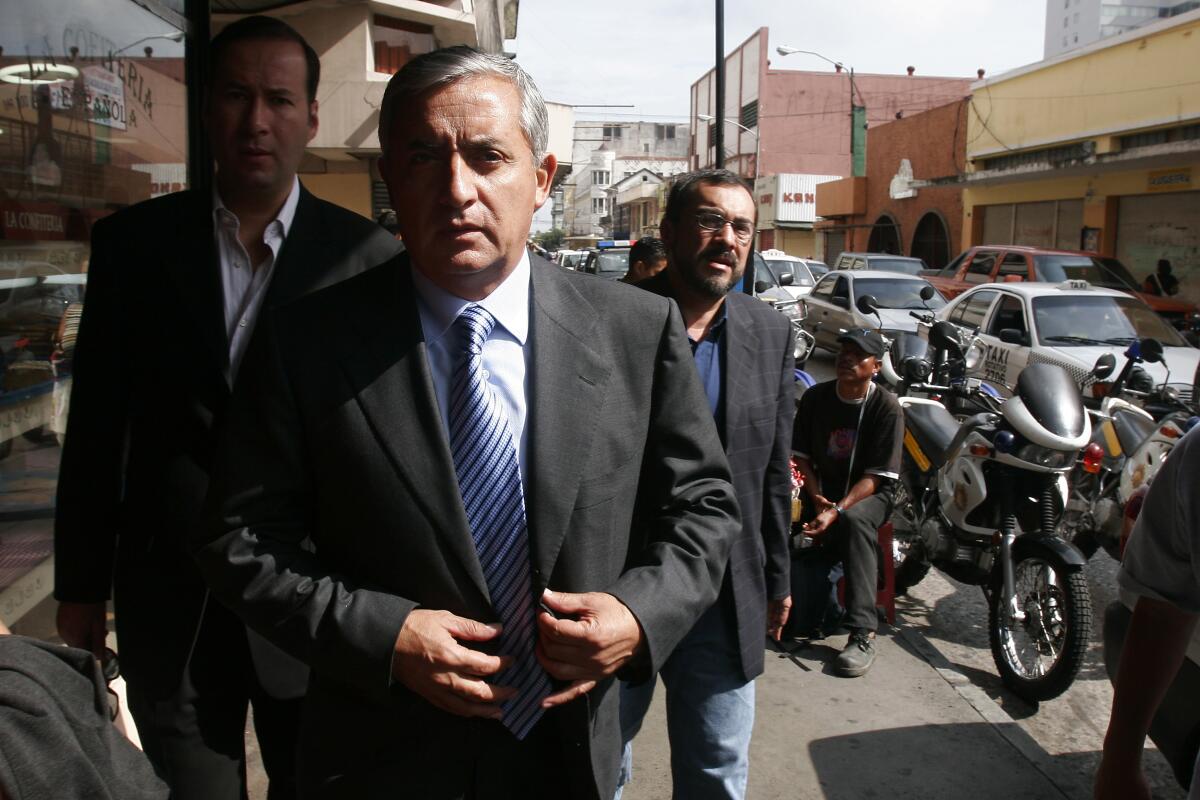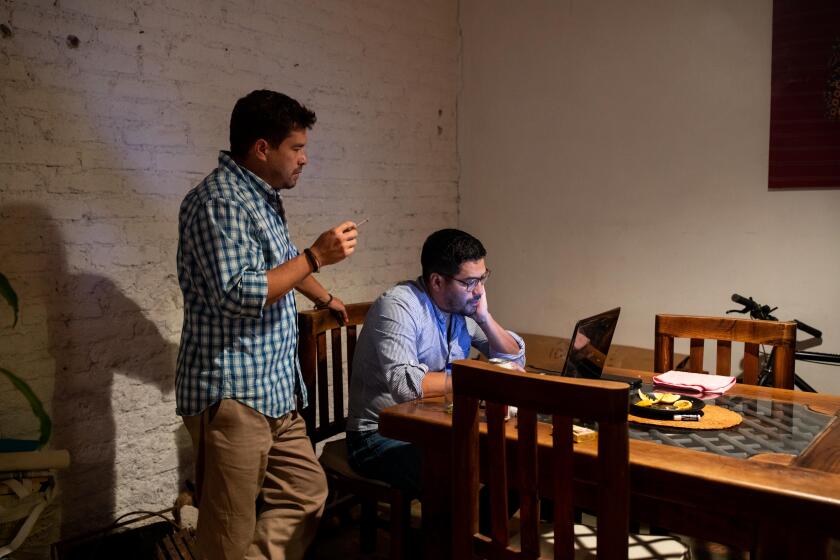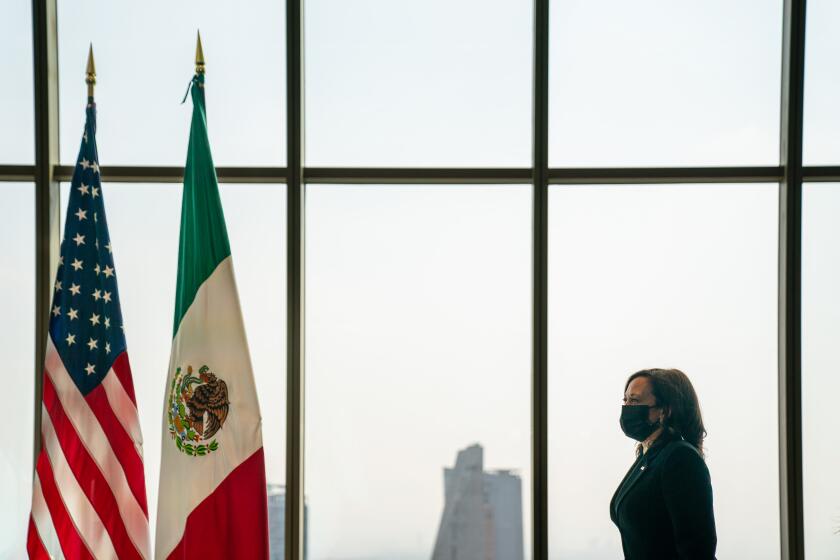He’s one of Guatemala’s last independent judges. Will he be forced to flee too?

- Share via
GUATEMALA CITY — As a judge who has worked for more than a decade in the fight against corruption here, Miguel Ángel Gálvez has taken on some of Guatemala’s most powerful people.
In 2012, he ordered former President Efraín Ríos Montt to be tried for genocide. Five years later, he sent former President Otto Pérez Molina to trial for graft.
Even as he faced criticism and occasional threats at home, Gálvez’s reputation for independence drew praise from the United States, which sees anticorruption efforts in Central America as crucial to reducing migration.
But nothing, he said, prepared him for the attacks he has faced in recent weeks.
Last month, after Gálvez ordered nine retired military and police officers to be tried for torture, murder and forced disappearance during Guatemala’s three-decade-long civil war, threats started pouring in.
Far-right activists aligned with President Alejandro Giammattei tweeted that Gálvez should “be in prison or in exile.” Strangers phoned, describing how they would kill him. Suspicious cars trailed him on the streets.
Gálvez serves on Guatemala’s Court for High Risk Crimes, which hears the country’s most sensitive criminal and corruption cases, and he asked the government to investigate the threats. Instead, the Supreme Court announced this week that it had accepted a petition to revoke Galvez’s judicial immunity, which is often a prelude to arrest.
He now faces a bleak decision that dozens of other members of Guatemala’s judicial system have confronted in recent years: Flee the country, or stay and risk being imprisoned.
The campaign against Gálvez is part of a growing wave of attacks on Guatemala’s courts that have forced more than 20 judges and prosecutors into exile. Several other anticorruption investigators have been jailed.
Pro-democracy advocates say it is an effort from conservative forces within the government to sap power from the country’s independent institutions and turn back the clock on Guatemala’s trailblazing anticorruption efforts, which were once celebrated as a model that could help curb crime across Latin America.
“The desire is to erase any legacy, any vestige” of anticorruption efforts, said political analyst Edgar Gutiérrez. “They are constructing an authoritarian state.”
Journalists in El Salvador who write about gangs can now be sent to prison. Two brothers defy the law with a story tying President Nayib Bukele to violent street gangs.
Similar attacks on democracy are happening across Central America. In Nicaragua, leftist President Daniel Ortega has imprisoned political opponents and journalists and violently repressed pro-democracy protests. In El Salvador, the government of President Nayib Bukele has purged the judiciary of critics, suspended civil liberties and jailed more than 36,000 people in recent months in what it calls a crackdown on street gangs.
The assault on Guatemala’s justice system began three years ago with attacks on the International Commission Against Impunity, an independent anticorruption body formed in 2006 to investigate the criminal groups that had come to dominate the country after peace accords ended the civil war in 1996.
The commission, known as the CICIG, was backed by the United Nations and partnered with local prosecutors to carry out investigations and bring cases to trial. It helped jail drug traffickers, war criminals and dozens of elected officials. In 2015, a CICIG investigation into a sweeping corruption ring led to the resignation of Pérez Molina, his vice president and the majority of his cabinet.

Opinion polls, along with massive protests supporting Pérez Molina’s ouster, showed that Guatemalans supported the commission, said Carmen Rosa de León, a sociologist and human rights activist. “It exposed the networks that control the state,” she said.
But the commission’s work attracted powerful enemies. After it opened an investigation into the family of President Jimmy Morales in 2018, Morales closed it and expelled its chairman from the country.
Soon, the government was targeting the prosecutors and judges who had inherited the commission’s cases.
They included Juan Francisco Sandoval, who had taken over corruption investigations and was fired by Atty. Gen. María Consuelo Porras, and Érika Aífan, another high-risk court judge, who was forced to flee the country this spring after she received threats and the Supreme Court appeared poised to strip her of immunity.
The Biden administration has sought to support the growing number of Guatemalan judges and prosecutors facing threats. Top officials, including Vice President Kamala Harris, have praised their work. And the U.S. recently sanctioned Porras, saying she had “repeatedly obstructed and undermined anticorruption investigations in Guatemala to protect her political allies and gain undue political favor.”
Despite the sanctions, Giammattei reappointed Porras to a second term in May. The president has complained about U.S. meddling in Guatemala’s domestic affairs, and pointedly skipped last week’s Summit of the Americas in Los Angeles.
Kamala Harris’ biggest assignment is in Latin America. But she hasn’t gone there much. She has a big assignment coming up representing the U.S. at the Summit of the Americas in Los Angeles.
At the same time, the U.S. continues to partner with Guatemala, sending hundreds of thousands of dollars in aid in recent years as part of a larger effort to curb migration from Central America.
“Why are we continuing to work with Guatemala?” said Jo-Marie Burt, a Latin American studies professor at George Mason University. “I don’t understand how you can be pouring money into a country whose government epitomizes the very corruption you claim to be combating.”
After so many of his colleagues were forced to flee, Gálvez knew it was only a matter of time before he was targeted.
“I knew ... they would come for me next,” he said in a recent interview.
He is seen as one of the last bulwarks against creeping authoritarianism in Guatemala, said Alejandra Colom, an anthropologist at the University of Del Valle here.
“Miguel Ángel Gálvez is attacked because he is one of the last bastions of ethics that remains,” she said.
The case he heard last month stemmed from documents — known as the “Death Squad Dossier” — recovered after from the civil war. In it, soldiers logged forced disappearances, extrajudicial killings and the torture of nearly 200 people.
Gálvez says his decision to send the soldiers to trial isn’t personal or political — it’s just his job.
He doesn’t want to leave Guatemala. “It is not easy for one to leave for another country,” he said. “My life is here, my family is here.”
But he knowns that if things get worse, he might end up joining the growing community of his former colleagues that now live in and around Washington, D.C.
During the civil war, he said, those standing up for democracy often met death.
“Today in 2022,” he said, “it is exile.”
Special correspondent Abbott reported from Guatemala City and Times staff writer Linthicum from Mexico City.
More to Read
Sign up for Essential California
The most important California stories and recommendations in your inbox every morning.
You may occasionally receive promotional content from the Los Angeles Times.












